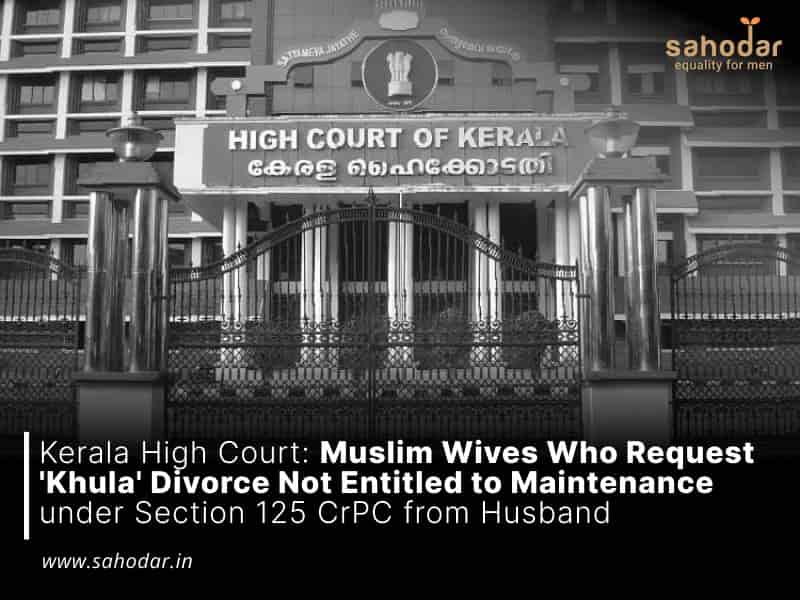The Kerala High Court has pronounced that a Muslim wife who procures a ‘Khula’ divorce is not eligible to assert her right to maintenance from her husband under Section 125 of the Code of Criminal Procedure (CrPC) subsequent to the pronouncement of ‘Khula’.
In a ‘Khula’ divorce, the dissolution of the marriage is instigated with the wife’s consent, and it typically involves a consideration provided by the wife to her husband for the termination of the marital union.
Section 125 (4) of the CrPC was meticulously examined, and Justice A. Badharudeen emphasized that a wife is disqualified from obtaining maintenance or interim maintenance if she is found to be engaging in adultery, if she unreasonably refuses to cohabit with her husband, or if they are living apart by mutual consent.
“When the wife effects divorce by Khula for getting her released from the husband, the same, in fact, is akin to refusal of the wife to live with her husband, as provided under Section 125(4) of Cr.P.C. If so, the wife, who effected divorce by Khula at her volition and thereby refuses to live with her husband voluntarily, is not entitled to get maintenance from the date of Khula in view of the restriction provided under Section 125(4) of Cr.P.C.,” the Bench observed.
The court’s judgment stipulated that the husband, who had filed a revision petition, must provide financial maintenance until the ‘Khula’ divorce had been formally executed.
In this particular case, the respondent wife, along with her child, initially sought redress in the Family Court, requesting financial support at a rate of Rs. 15,000 per month for the wife and Rs. 12,000 per month for the child. The wife contended that she had cohabited with the petitioner until December 2018 but subsequently left due to his alleged cruelty and accusations of an extramarital relationship. It was further asserted that the wife had initiated the process of ‘Khula’ from May 27, 2021.
The petitioner, in response, submitted that he had been providing financial support to his wife and had experienced business losses in 2018. He maintained that the wife left him following these financial setbacks and contended that her involvement with another man had led to the dissolution of their marriage. The Family Court, in light of the absence of substantial evidence to substantiate the allegations of adultery, rendered a decision awarding maintenance at the rate of Rs. 10,000 per month for both petitioners.
The pivotal issue confronting the court was whether a wife, who asserts the dissolution of her marriage through ‘Khula’, can subsequently seek financial maintenance. The court made reference to Mulla’s Principles of Mahommedan Law, elucidating the ramifications of ‘Khula’ and ‘Mubara’ in the context of divorce, and underscored that a divorce brought about by means of ‘Khula’ or ‘Mubara’ does not absolve the husband of his obligation to provide maintenance for the wife during her iddat (waiting) period, or to support their children.
Furthermore, the court cited a series of Supreme Court judgments, including Mohd. Ahmed Khan v. Shah Bano Begum & Ors. (1985), Danial Latifi & Anr. v. Union of India (2001), and Shamima Farooqui v. Shahid Khan (2015), to emphasize that a divorced Muslim wife can assert her entitlement to financial maintenance under Section 125 of the CrPC until she remarries, unless the husband makes a reasonable and equitable provision for her within the iddat period or thereafter, in accordance with the provisions of the Muslim Women (Protection of Rights on Divorce) Act, 1986.
Nevertheless, the court noted that Section 125(4) of the CrPC stipulates that a wife is not eligible for financial maintenance if she is engaged in adultery, unreasonably refuses to cohabit with her husband, or if they are residing separately by mutual consent. The court discerned that ‘Khula’ is tantamount to the wife’s refusal to cohabit with her husband, as specified in the statute.
The court conducted a meticulous examination of the documentary evidence submitted by the petitioner to substantiate the claim that the wife was involved in an extramarital relationship and had become pregnant as a result.
The court ascertained that the ‘Khula’ had been formally pronounced only on May 27, 2021, while the legal dispute between the parties had commenced in 2019. The court found that until this juncture, the parties had cohabited until December 2018.
As a result, the court concluded that the pregnancy fell within the legal presumption of legitimacy, as prescribed by Section 112 of the Evidence Act. Furthermore, the court underscored that the medical document furnished by the petitioner did not lend credence to the assertion of an adulterous relationship involving the wife.
In light of these considerations, the court determined that the first respondent lacked a stable source of employment or income to provide for herself and the child. Consequently, the court affirmed the award of financial maintenance to the wife and child, albeit reducing the wife’s monthly maintenance to Rs. 7,000 until May 27, 2021, while retaining the child’s maintenance at Rs. 10,000 per month.

